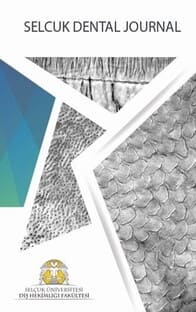Farklı post ve kron materyalleri ile restore edilmiş endodontik tedavili maksiller santral kesici dişlerde stres dağılımı
Amaç: Yapılarında meydana gelebilecek kırılmalardan dolayı endodontik olarak tedavi görmüş dişlerin restorasyonu restoratif diş hekimliğinde yaygın bir problemdir. Oklüzal kuvvetlere dayanabilecek uygun post ve kron materyalinin seçilmesi gereklidir. Bu çalışmanın amacı sonlu elemanlar stres analiz yöntemi kullanarak farklı post ve kron materyallerinin diş restorasyon kompleksindeki stres dağılımını incelemektir.Gereç ve Yöntemler: 2 farklı post materyali (everStick ve cosmopost) ve 2 farklı kron materyali ( IPS Empress e.max ve Cercon) içeren endodontik olarak tedavi edilmiş maksiler santral kesici dişi simüle eden 3-boyutlu sonlu elemanlar modelleri hazırlanmıştır. Sonlu elemanlar modellerinde kök yüzeyindeki tüm noktalar sınır koşulları olarak sabit kabul edilmiştir. 300N’luk statik oklüzal yük kronun palatal yüzeyine 135°’lik bir açıyla uygulanmıştır. Modellerin stres transfer karakteristiklerindeki farklılıklar analiz edilmiştir.Bulgular: Bütün modellerde maksimum stres kuvvet uygulanan alanlarda konsantre olmuştur (10MPa). Cosmopost’ta gözlenen maksimum stresler (2.5MPa) everStick’de gözlenenlerden (1.6 MPa) daha yüksek bulunmuştur. Cercon ve e.max kronların her ikisi için de maksimum stresler kronun bukkal ve lingual marjinlerinde yoğunlaşmıştır (5.8 MPa, 5.0 MPa). Fakat e.max’deki stres değer ve dağılımları Cercon kronla karşılaştırıldığında daha homojen ve daha düşük bulunmuştur.Sonuç: Bu çalışmanın sonuçlarına göre endodontik tedavili bir dişe everStick post uygulanarak e.max seramik ile restore edildiğinde restorasyon-diş kompleksindeki von Mises stresleri azalmaktadır.
Anahtar Kelimeler:
Post-kor, sonlu elemanlar stres analizi, dental kron
Stress distribution in endodontically treated maxillary central incisor restored with different post and crown materials
Background: Restoration of endodontically treated teeth is a common problem in restorative dentistry, related to the fractures occurring in such teeth. It is necessary to obtain appropriate post and crown material to withstand occlusal forces. The aim of this study was to evaluate the influence of different post and crown materials on the stress distribution of the restoration tooth complex, using Finite Element Analysis (FEM). Methods: 3-D finite element (FE) models simulating an endodontically treated maxillary central incisor restored with 2 different post materials (everstick and cosmopost) and two different all-ceramic crown materials (IPS Empress e.max and Cercon) were prepared. The nodes of the root surfacein the FE models were fixed in all directions as the boundary conditions. A 300 N static load was applied to the palatal surface of the crown with a 135°angle to the long axis of the tooth. The differences in stress transfer characteristics of the models were analyzed. Results: Maximum stress was concentrated on force application areas for all models (10 MPa). The stress values observed with cosmopost (2.5 MPa) were higher than that of everstick (1.6 MPa). Maximum stresses were observed at buccal and lingual cervical margins of crown for both Cercon and e.max crowns (5.8 MPa, 5.0 MPa). But the stress values and distribution in e.max were more homogeneous and lower than Cercon crown. Conclusion: The result of this study demonstrated that use of an everstick post in endodontically treated teeth restored with e.max ceramic reduces the values of von Mises stresses on tooth-restoration complex.
Keywords:
Dental crown, finite element analysis, post-core,
___
- Akça K, Iplikçioğlu H, 2001. Finite element stress analysis of the influence of staggered versus straight placement of dental implants. Int J Oral Maxillofac Implants, 16, 722–730.
- Akkayan B, Gülmez T, 2002. Resistance to fracture of endodontically treated teethrestored with different post systems. J Prosthet Dent, 87, 431–437.
- Asmussen E, Peutzfeldt A, Sahafi A, 2005. Finite element analysis of stresses in endodontically treated, dowel-restored teeth. J Prosthet Dent, 94, 321–329.
- Assif D, Oren E, Marshak BL, Aviv I, 1989. Photoelastic analysis of stress transfer by endodontically treated teeth to the supporting structure using different restorative materials. J Prosthet Dent, 61, 535–543.
- Ausiello P, Apicella A, Davidson CL, 2002. Effect of adhesive layer properties on stres distribution in composite restorations- a 3D finite element analysis. Dent Mater, 18, 295-303.
- Beer FP, Johnston R, 1993. Chapter6: transformations of stres and strain, mechanics of materials. 2nd SI Metric ed. Singapore: McGraw-Hill International Editions, pp; 367–369.
- Boschian Pest L, Guidotti S, Pietrabissa R, Gagliani M, 2006. Stress distribution in a post-restored tooth using the threedimensional finite element method. J Oral Rehabil, 33,690–697.
- ISSN: 2148-7529
- Yayın Aralığı: Yılda 3 Sayı
- Başlangıç: 2014
- Yayıncı: Selcuk Universitesi Dişhekimliği Fakültesi
Sayıdaki Diğer Makaleler
MÜJDE SEVİMAY, ÖZGÜN YUSUF ÖZYILMAZ, Oğuz ERASLAN
UMUT ÇAKAN, TUBA YILMAZ SAVAŞ, Haluk Barış KARA
MUKADDER İNCİ BAŞER KOLCU, Erhan ÖZCAN
Maksiller alveolar proses kırığının geç dönem redüksiyonu: Olgu sunumu
Hasan KÜÇÜKKOLBAŞI, ALPARSLAN ESEN, N Burcu BAYRAK
Protetik tedavilerde lazerlerin kullanımı
Yusuf Ziya AKPINAR, ÖNJEN TAK, Özlem KOÇ, Aslıhan ÜŞÜMEZ
Üç kanallı ve fraktür hattına sahip üst birinci küçük azı dişin retreatment tedavisi: Olgu sunumu
DURMUŞ ALPEREN BOZKURT, HALE ARI AYDINBELGE
Fosfor plak kullanılarak farklı kaide materyallerinin radyoopasitelerinin karşılaştırılması
